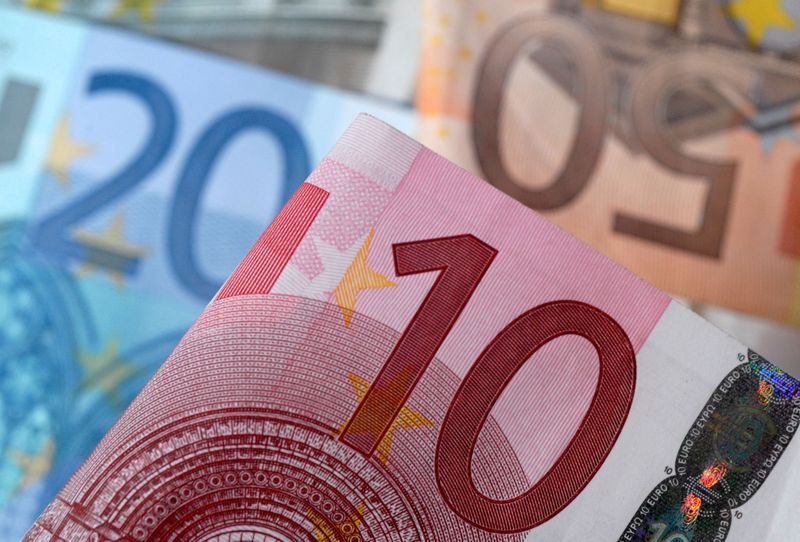By Yoruk Bahceli
(Reuters) - European companies hoping to fund M&A and capital expenditures on bond markets this year are facing a sudden jump in borrowing costs and wary buyers after the ECB's shock pivot towards tighter monetary policy.
Bond issues are a key source of funding for companies and have grown in importance relative to bank loans in the euro zone, particularly since the financial crisis.
Caught out by European Central Bank President Christine Lagarde's hawkish tone after the bank's February meeting - which opened the door to rate hikes this year - bonds from investment-grade (IG) European firms have seen yields surge 60 basis points.
Euro credit had been less hit by January volatility stirred by the U.S. Federal Reserve's hawkishness, with IG bonds delivering less than half the losses in the United States.
But those falls accelerated post-ECB and yields have more than doubled this year to as high as 1.18%, the highest since May 2020, according to BofA.
That's still extremely low, but a sudden jump in borrowing costs is significant. If continued, it can impact companies' ability to invest, eventually slowing economic growth, so central banks watch credit spreads carefully.
Nearly half of investors in BofA's February credit investor survey said IG spreads rising to 150-175 bps, from around 110 bps currently, would prompt a dovish turn from the ECB.
A mergers and acquisitions boom and the need for capital investment has been seen by many as driving a rise in European corporate bond sales this year -- JPMorgan (NYSE:JPM) for instance expects a record 645 billion euros of IG issuance.
While moves so far are not enough to derail those expectations, Helene Jolly, head of EMEA IG corporate syndicate at Deutsche Bank (DE:DBKGn), said borrowers and investors were adjusting to "the new normal".
"Corporates have had to look at the new levels of coupons that are being required because of the rates being paid... and investors have had to think about what does this mean for me, what's my outlook on rates now and where do I want to play," Jolly said.
Sentiment has turned rapidly -- just 16% of European credit investors are positioned net long on IG debt, the lowest since 2019 and down from 27% in December, while corporate debt funds are holding more cash than they have in years, BofA's survey found.
One consequence has been declining bond sales -- in the two weeks since the ECB meeting companies have raised around 9 billion euros, similar to volumes in the single week up to the meeting, according to Refinitiv IFR data. Several sessions delivered zero issuance.
(Graphic: https://fingfx.thomsonreuters.com/gfx/mkt/mopanyenqva/euro%20IG%20chart.png)
WARY
Because many companies borrowed cheaply and abundantly during the pandemic, there is no panic over their ability to refinance debt, even for sub-investment grade, "junk" issuers.
Just two junk issuers have sold bonds since the ECB, according to IFR. The vast majority of issuance came from Italian credit management and data group Cerved, which raised most of its funding from a floating-rate bond. Those compensate investors as interest rates rise.
"People are wary about new issues, not because they think they are bad credits, but they're concerned that if you buy a credit with a 3.5% yield today and in a week the same credit is yielding 3.75%, your bond's down a couple of points," said Ben Thompson, JPMorgan's co-head of EMEA leveraged finance capital markets.
ISSUANCE BOOM?
Issuers may have to start hitting markets soon with the ECB expected to halt bond purchases by September.
The ECB last year bought over 70 billion euros of company debt, around 6% of its total purchases during that period.
IG spreads have widened over 25 bps this year and the additional premium companies pay for new bond sales are already higher than the average since 2015, according to BNP Paribas (OTC:BNPQY).
Viktor Hjort, global head of credit strategy at BNP, estimates an upcoming rush for M&A and capex-linked borrowing could widen spreads another 15 bps.
"Corporates have significant need for spending, especially capex, which is unsustainably low... so the credit market is going to have to fund a capex cycle, and it's also facing a demand shock," Hjort said.
In the junk market, critical for financing leveraged buyouts, the average coupon on BofA's index exceeds its yield, according to Refinitiv Datastream, so on average, new issuance will cost firms more than the interest on their current debt.
Still, higher yields aren't expected to derail borrowing.
Shanawaz Bhimji, strategist at ABN AMRO (AS:ABNd), estimates that firms' total returns from equity this year will exceed the current cost of equity even when assuming a much higher cost of net debt than current rates, so they should continue investing in M&A and capex.
To cheapen funding, borrowers may opt for shorter-dated financing or issue floating-rate notes, patterns already emerging on some deals, the bankers said.
"Issuers are going to have to be realistic about the cost of debt," Thompson at JPMorgan said.
